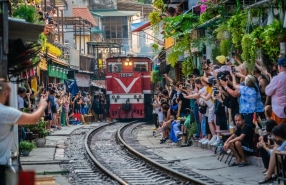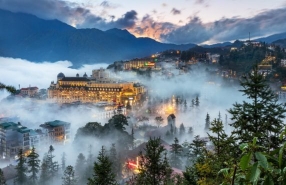Patuxai Monument Laos - Discover Vientiane’s Arc De Triomphe

The Patuxai Monument is a bit of a landmark that you immediately notice when you arrive in Vientiane. Located at the end of the main Lane Xang Avenue, it is often called the Arc de Triomphe of Laos or the Vientiane Arc de Triomphe. Built in the 1960s, the Patuxai Laos displays a style that blends local influences with European touches. It is not just a commemorative monument: deep down, it is part of the daily life of the capital. Many stop there for the view, others simply because it is impossible to ignore. And the question always remains the same: what to do at the Patuxai Monument and around ? Discover the Patuxai Monument and its surroundings with Autour Asia !
Patuxai Monument Laos – Discover Vientiane’s Arc de Triomphe
1. Location and History of Patuxai
The Patuxai Monument occupies a central place in Vientiane. It is located at the end of Lane Xang Avenue. When walking along Lane Xang Avenue, it's impossible not to see it. Locals often refer to it as the Arc de Triomphe Vientiane, while others use the name Laos Arc de Triomphe. Regardless of the term, it remains a visual and historical landmark.

Construction of Patuxai Laos began in the 1960s, just after independence. The idea was to honor the fighters who fell for the country. Some of the materials used even came from an airport project that was never built. A detail that raised a smile on many, earning the monument a somewhat ironic nickname: "the vertical runway." Today, Victory Gate Laos no longer serves only a commemorative function. It has become a national symbol and a place for strolling. You may encounter families, curious travelers, or simply locals who come to enjoy the surrounding park. Many people wonder what to do at Patuxai Monument ? Admire the architecture, climb up to see the city from above, or simply sit and observe local life.
2. Architecture and Symbolism
At first glance, the Patuxai Monument looks like the Arc de Triomphe in Paris. That is why people often call it the Arc de Triomphe of Vientiane. But the closer you walk, the more you see it’s not French at all. The Patuxai Victory Gate is full of Lao details - nagas curling on the walls, Buddhist figures, flowers carved in stone. It feels more like a temple than a military arch.

Patuxai Laos is approximately 55 meters high and 24 meters wide. The building has seven levels: four are used as offices, another houses a small museum, one is used for ceremonies, and the last is an observation deck. The Patuxai Monument has five towers. They symbolize both Buddhist values and national unity. Inside, the painted ceilings are eye-catching. A visit to the Vientiane Arch of Triumph features frescoes depicting Hindu deities, asparagus, and cosmic scenes. Although some of the paintings show the marks of time, they enhance the charm of the place.
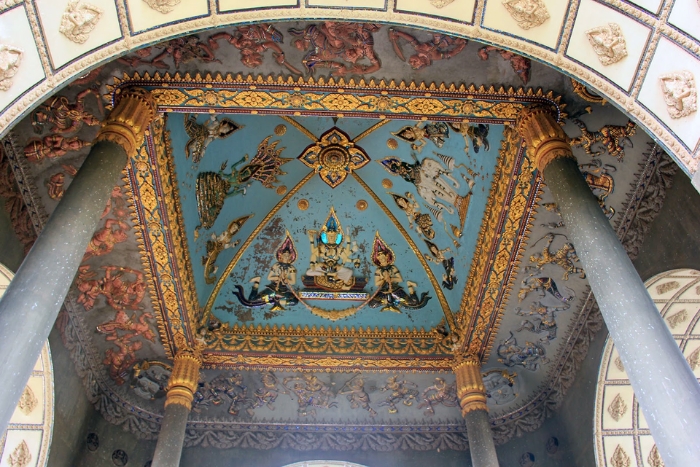
This contrast between the Western form and the Asian details conveys a clear message: Patuxai Victory Gate is a monument of memory, but also of cultural affirmation. The architecture thus becomes a language, a way for the country to say "we are independent but open." For visitors, the question of what to do at the Patuxai Monument naturally arises. Observe the decorations, take some time in the gardens, or climb the stairs. The climb is a little tiring, especially in hot weather, but the panoramic view of Vientiane is more than worth the effort.
Learn more:
How To Get Around Vientiane ?
Things To Do In Vientiane With Kids
Where To Stay In Vientiane ?
3. Opening Hours, Prices, and Practical Information
The Patuxai Monument is easy to find. It's located in the center of Vientiane, at the end of Lane Xang Avenue. Many people walk there from the city center. Access is simple; no reservation is required.
- Patuxai Laos's opening hours are generally from 8 a.m. to 5 p.m. Sometimes, there's a short break around noon. It's best to check directly on site, especially during the rainy season when everything can close earlier.
- The entrance fee is very low, only 3,000 kip to go up. The gardens around the Arc de Triomphe Vientiane are free, making them accessible to all.
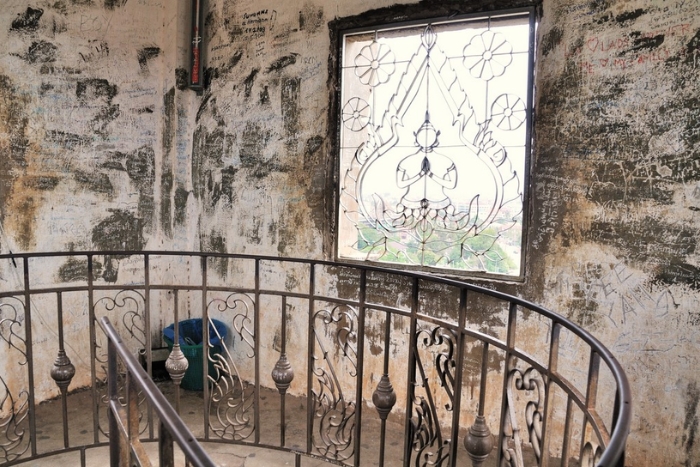
Inside the Patuxai Laos, a narrow staircase leads slowly up toward the terrace. The climb is short, though in the hot Lao sun it can feel heavy. Luckily, the way is broken into several floors. Each level has little kiosks where women sell cold drinks, postcards, and small handicrafts, good excuses to pause for a minute before moving on. Around the base of the Arc de Triomphe Vientiane, the scene is lively. Families gather under the trees, kids chase each other across the grass, and teenagers pose for photos against the arch. Travelers at the Victory Gate Laos usually ask the same thing: what to do here ? The answer is simple, look up at the painted ceilings, walk in the gardens, maybe buy a small souvenir, or just sit back and watch daily life in Vientiane circle around this landmark.
4. What to do at and around Patuxai Monument ?
The Victory Gate Laos is not only something to look at from afar. Climbing up is the first thing most people try. The staircase isn’t very long, but it feels endless in the midday heat. At the top, the breeze is welcome, and the view stretches far: Lane Xang Avenue straight as an arrow, small houses scattered around, and even the mountains faint on the horizon.
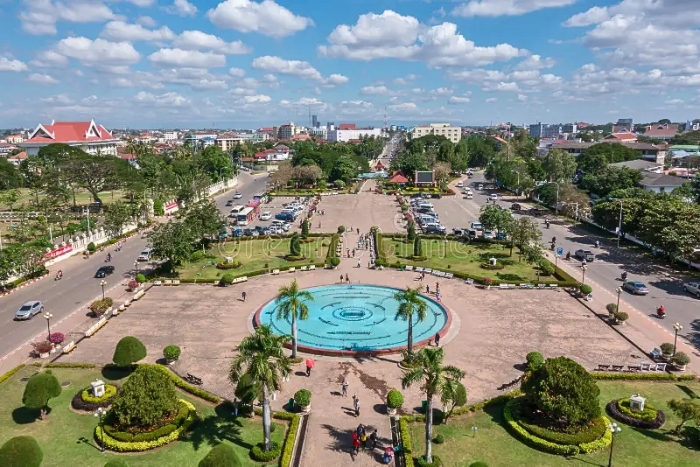
On the ground, the gardens around the Arc de Triomphe Vientiane are busy in the late afternoon. Kids chase each other by the fountain, couples sit on the grass, students eat snacks under the trees. Tourists mix in, taking photos or just resting. Inside Patuxai Laos, the little shops are half souvenir, half convenience store. You’ll find textiles, cheap bracelets, and cold drinks, nothing fancy, but good for a short pause.
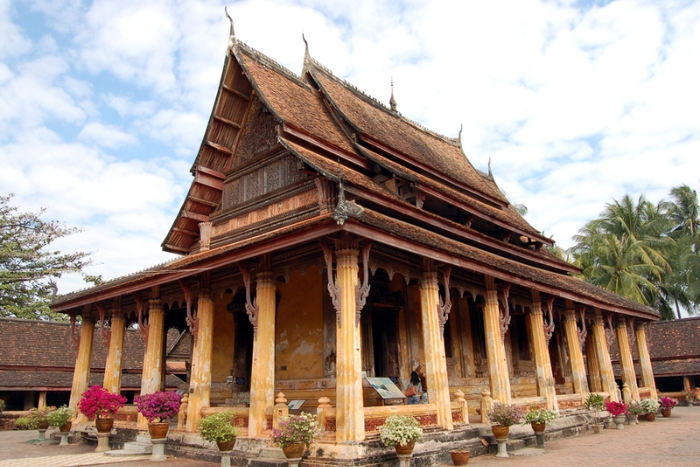
Walk a bit further and more places appear. Chao Anouvong Park by the Mekong is nice at sunset, and nearby temples like Wat Sisaket keep a calmer mood. On Lane Xang Avenue, cafés and food stalls stay open until night, so the area never feels empty. For anyone asking what to do at the Victory Gate Laos, the list is simple but full: climb, take photos, sit in the shade, buy something small, and keep walking through a part of Vientiane that always has movement.
5. Visiting Patuxai - What to note?
To fully enjoy the Patuxai Monument, a few practical tips can make all the difference.
- Choose the right time: Visit the Patuxai Monument early in the morning or late afternoon to avoid the heat and take advantage of ideal lighting for photos.
- Wear comfortable shoes: the climb to the terrace of Patuxai Laos involves several stairs, so minimal equipment makes the experience easier.
- Bring water: This is essential, especially during the dry season, to stay hydrated during the visit.
- Stop at the different levels: The monument has several floors where you'll find small shops and interesting exhibitions.
- Bring local currency: Entrance fees and souvenirs are generally paid in Laotian kip, so bring small bills.
- Respect the site: Although the Arc de Triomphe in Vientiane is a tourist attraction, it remains a commemorative monument; It is advisable to avoid overly skimpy clothing and to remain discreet.
The Patuxai Monument is today a simple but essential landmark in Vientiane. Built in the 1960s, often referred to as the Vientiane Arc de Triomphe, it reflects a relatively recent history and a blend of influences. The site attracts both locals and travelers: panoramic views from the terrace, strolls through the gardens, or simply a break on Lane Xang Avenue. Patuxai Laos remains, above all, a national symbol, easily accessible and integrated into the daily life of the capital. A must-see during a stay in Laos. With Autour Asia - Laos travel guide, discover even more ideas for exploring Vientiane and its surroundings.
Patuxai Monument is often nicknamed the Arc de Triomphe Vientiane due to its resemblance to the Arc de Triomphe in Paris. However, its identity is quite distinct. Built in the 1960s, the monument combines a structure inspired by European architecture with typically Laotian decorations. This contrast expresses the country's desire to mark its independence while promoting its culture. Today, Patuxai Laos is both a historical symbol and a place of life, appreciated by locals and travelers alike.
Buddha Park, or Xieng Khuan, is a monumental garden located just an hour from Vientiane. It features giant statues, Hindu and Buddhist deities, and a surprising setting blending art and spirituality. The location is ideal for a half-day or full-day excursion. For travelers, a visit to the park fits perfectly into an itinerary that also includes the Patuxai Monument or the temples in the city center. This allows for a combination of cultural discovery, outdoor walks, and exploration of Laos' iconic sites.
A 14-day trip to Laos combines nature, culture, and history. In Vientiane, a visit to the Patuxai Monument, also known as the Vientiane Arc de Triomphe, provides a wonderful introduction to the capital. You can then explore Luang Prabang with its temples and the Kuang Si Waterfalls, before continuing to Vang Vieng for its karst landscapes. The Bolaven Plateau and the 4000 Islands region offer an immersion in a more authentic Laos. This type of itinerary perfectly balances cultural moments, local discoveries, and relaxation, with the Patuxai Laos as a symbolic stopover.
Related travel guide
Other similar articles
CUSTOMIZABLE BY LOCAL EXPERTS
Personalized trip at the original price!
REFUND GUARANTEE
We believe in our work and promise to give you money back.
GOOD PRICE / QUALITY
95% satisfied more than expected!
24/7 LOCAL SUPPORT
We are always available online to provide assistance at any time.
Most read articles
Autour Asia is highly recommended on
Embracing the mission of "Satisfied more than expected" and providing authentic experiences, we have received numerous recommendations on reputable travel forums:














